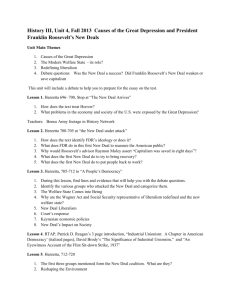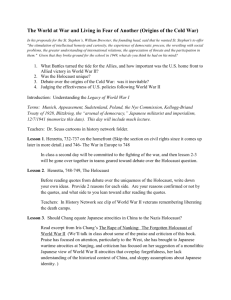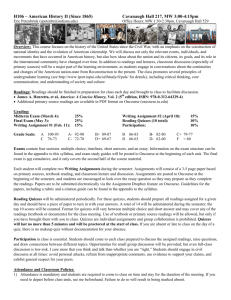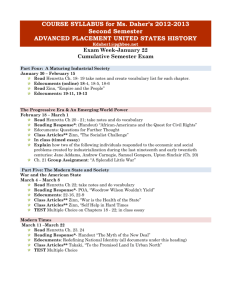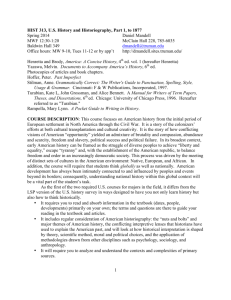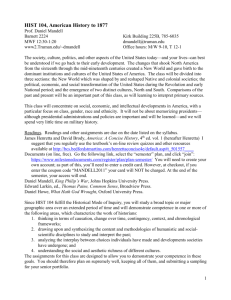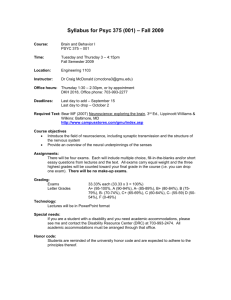CLASS INFORMATION SHEET -- HISTORY 17B HISTORY OF THE
advertisement
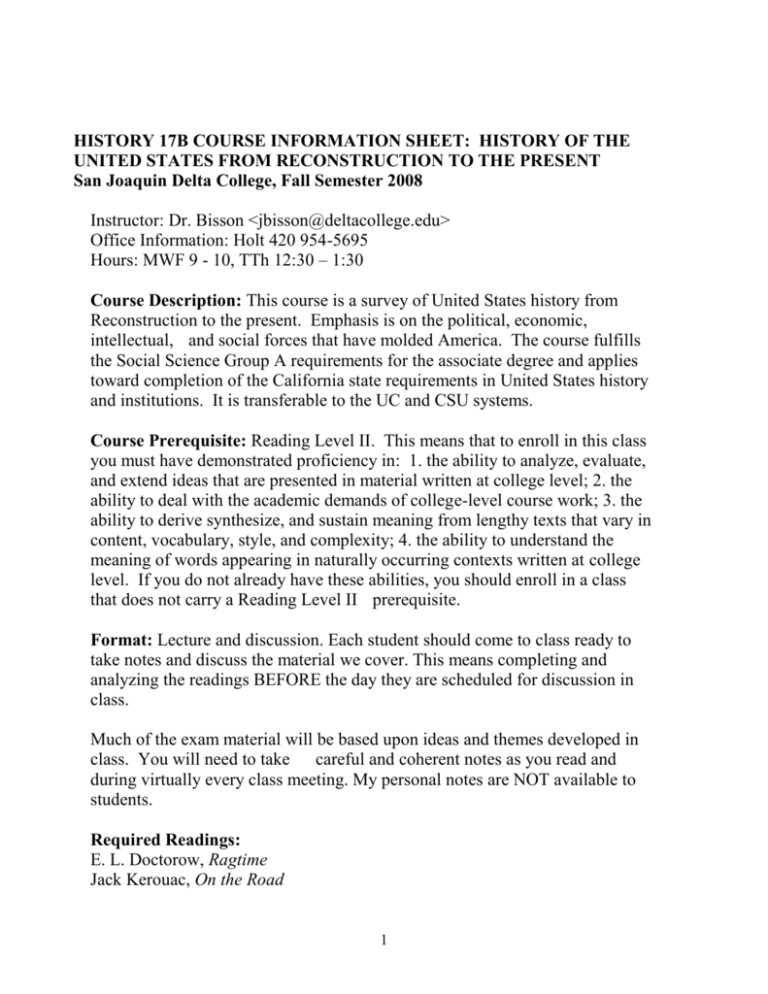
HISTORY 17B COURSE INFORMATION SHEET: HISTORY OF THE UNITED STATES FROM RECONSTRUCTION TO THE PRESENT San Joaquin Delta College, Fall Semester 2008 Instructor: Dr. Bisson <jbisson@deltacollege.edu> Office Information: Holt 420 954-5695 Hours: MWF 9 - 10, TTh 12:30 – 1:30 Course Description: This course is a survey of United States history from Reconstruction to the present. Emphasis is on the political, economic, intellectual, and social forces that have molded America. The course fulfills the Social Science Group A requirements for the associate degree and applies toward completion of the California state requirements in United States history and institutions. It is transferable to the UC and CSU systems. Course Prerequisite: Reading Level II. This means that to enroll in this class you must have demonstrated proficiency in: 1. the ability to analyze, evaluate, and extend ideas that are presented in material written at college level; 2. the ability to deal with the academic demands of college-level course work; 3. the ability to derive synthesize, and sustain meaning from lengthy texts that vary in content, vocabulary, style, and complexity; 4. the ability to understand the meaning of words appearing in naturally occurring contexts written at college level. If you do not already have these abilities, you should enroll in a class that does not carry a Reading Level II prerequisite. Format: Lecture and discussion. Each student should come to class ready to take notes and discuss the material we cover. This means completing and analyzing the readings BEFORE the day they are scheduled for discussion in class. Much of the exam material will be based upon ideas and themes developed in class. You will need to take careful and coherent notes as you read and during virtually every class meeting. My personal notes are NOT available to students. Required Readings: E. L. Doctorow, Ragtime Jack Kerouac, On the Road 1 Bisson (ed.), American Passages: Documentary Readings in United States History from Columbus to the Present (2006). Available in the bookstore.***BRING THIS BOOK TO CLASS EVERY DAY.*** Henretta, America: A Concise History. Henretta study aids are available online at: bedfordstmartins.com/henrettaconcise. Graded Work: Two (2) multiple-choice exams (15%) Two (2) essay exams (TBA) (40%) One (1) documents analysis paper (20%) Comprehensive essay exam (25%) Exams will be based upon material from class lectures, classroom discussions, and the assigned readings. Note-taking: This is an important skill to have for this class. When taking notes in class, do not attempt to write down every word I say, or every word that appears on the screen. Devise your own system of shorthand. Abbreviate common words. Re-write your notes, especially when preparing for exams. Listen to what I am saying and pay attention to ideas and themes that I repeat, or that my lectures have in common with the reading assignments. Plagiarism: Plagiarism is the use of someone else’s words, answers, and ideas and representing them as your own. Plagiarism is cheating, and it is a violation of the rules of academic conduct at SJDC. The plagiarized assignment will receive a zero (F) grade. Removal from the class and/or college may also result. See the SJDC Student Handbook for further details. Attendance and Drops: I reserve the right to drop no-shows as per SJDC policy. Remember: It is your responsibility to drop the class. I am under no obligation to drop you and am not obligated to accommodate requests for late drops. It is your responsibility to get missed lecture notes and other course information from a classmate. Missed Exams Policy: No make-ups permitted without a verifiable physiciandocumented medical excuse. Advanced notice required for SJDC-approved activities that conflict with exam days. I determine the format of make-up exams. Basic Manners: 1. Punctuality: Please be on time and ready to work. Late arrivals disturb me 2 and the other people in the class. This is a college learning environment that grants students discretion and considerable freedoms that, if abused, compromise the learning environment. I reserve the right to lock the classroom door to enforce this policy. I also reserve the right to ask late arrivals to leave the class. If you have a situation that is beyond your control that will regularly make you late, please inform me as soon as possible. Late students forfeit their right to sign the roll sheet or be counted as present. 2. Do not socialize while class activities are in progress. This is a discourtesy to the other people in the class. 3. Early Departures: Please do not leave class early without notifying me before class begins. If you have a medical condition that keeps you from sitting for 50 minutes, please notify me. 4. Cell Phones, pagers, music players, radios, etc.: Turn these off and put them away in purses, pockets, or backpacks where you cannot access them. Remove headphones/ear buds, etc. 5. No Food or Drink in Class 6. Do not sleep in class or place your head down on the desk. 7. Keep the desks in rows and facing the front of the class unless otherwise instructed. Repeated violations of these rules may result in suspension from the class, referral to the Vice President of Student Services, and expulsion from the class. Your Grade: Assignments will be graded according to the following scale. 90-100% A (Excellent); 80-89% B (Good to Very Good);70-79% C (Average); 60-69% D (Poor); Below 60% F (Failing) 3 SCHEDULE OF TOPICS, READINGS, AND ACTIVITIES (subject to change) Be sure to complete the readings by the beginning of the week or day for which they are assigned. Keep up with the readings and pay close attention to due dates. Henretta readings are listed for each part of the class. Henretta study guides are at bedfordstmartins.com/henrettaconcise. PART I: THE EMERGENCE OF MODERN AMERICA August 15 Introduction & The South After Slavery Read Henretta, Chapter 15 and pp. 581-587 From AP Chapter 8: “The Black Codes,” “Frederick Douglass Speaks to Abolitionists, “The Fourteenth Amendment,” ‘A Georgian Calls for Brute Force,” A South Carolina Republican.” August 18, 20, 22 The South After Slavery; The Wars Against the Indians From AP Chapter 8 “A Sharecrop Contract,” Ida Wells, Booker T. Washington, W.E.B. DuBois, “Black Migration Patterns, 1870-1920,” “Massacre at Sand Creek,” “Custer at the Washita River,” “An Indian Commissioner,” “Custer’s Last Stand,” “Chief Joseph Offers and Solution,” “A Native American Tries Assimilation” August 25, 27, 29 The Wars Against the Indians;The Industrial Revolution Read Henretta, Chapter 17 From AP Chapter 9: Illinois Grangers, “Terrence Powderly, Samuel Gompers, “A Tailor Testifies,” “Testimony of a Spinner,” “An Advocate of Scientific Management,” A Harvard Economist. September 3 & 5 (Labor Day Observed Monday, Sept. 1) The Industrial Revolution Read Henretta, Chapter 18 September 8, 10, 12 The Farmers’ Revolt 4 Read Henretta, Chapter 19 From AP: “Populist Party Platform,” A Republican Editor, “A London Paper Gloats.” ***Multiple Choice Exam #1 Friday September 12*** PART II: THE EARLY 20TH CENTURY AND THE SEARCH FOR A NEW ORDER September 15, 17, 19 The Imperial Republic; The Progressives Read Henretta, Chapter 21 From AP Chapter 10: “Anglo-Saxonism and US Expansion,” McKinley’s War Message,” “McKinley Decides to Annex the Philippines,” “The March of the Flag,” “An Anti-Imperialist Professor,” Mark Twain’s satire, “President Roosevelt Updates US Policy in Latin America.” September 22, 24, 26 The Progressives; World War I Class discussion: Ragtime (details TBA) Read Henretta, Chapters 20 and 22 From AP Chapter 11: “A Journalist Attacks the Trusts”, “Conditions in the Meatpacking Plants,” “Robert Lafollette and the Money Trusts,” “Louis Brandeis and the Problem of Interlocking Directorates,” New Nationalism, “Progressive Party Platform,” “Wilson’s Views on Reform.” September 29, Oct 1, 3 World War I and Wilsonian Internationalism From AP Chapter 12: The President’s War Message,” “The American Defense Society,” “The Creel Committee,” “A Radical Attacks the War Mongers,” “President Wilson Promotes his Fourteen Points,” “A Senator Opposes Membership,” “the War’s Effect on Black Consciousness,” “The Attorney General Speaks Out Against the Reds.” ***ESSAY EXAM #1 FRIDAY OCT. 3*** October 6, 8, 10 The 1920s Read Henretta Chapter 23 From AP Chapter 13: “A look Back at the Election of 1920,” “President Coolidge on the Virtues of Business,” “An Advertising Man’s View of Jesus,” “Advertising and Corporate Image-making,” “Margaret Sanger Advocates 5 Birth Control,” “The supreme Court Rules on Female Equality,” “The Klan Defends Its Principles,” “A Nativist Describes Disturbing Trends,” Marcus Garvey, Langston Hughes. Into the Great Depression Read Henretta Chapter 24 From AP Chapter 14: “An Economist’s Warning,” “An Editor Describes Conditions After the Crash,” ‘Hoover Defines the Proper Role of Government,” “FDR’s First Inaugural Address” October 13, 15, 17 The New Deal & the Politics of Mass Poverty Read Henretta Chapter 25 From AP: “Radio Priest’s Preamble,” “Share Our Wealth,” “FDR Justifies Massive Public Works,” “Candidate Roosevelt Speaks about Social Security,” “Candidate Roosevelt Attacks ‘Economic Royalists,’” “The New Deal and the Unions” section. PART III: Rise to Globalism: THE SECOND WORLD WAR AND AFTER October 20, 22, 24 ****Essay Exam #2 Monday Oct 20**** Isolation or Intervention? Read Henretta Chapter 26 From AP Chapter 15: “Charles Coughlin Condemns the World Court,” “The Neutrality Act of 1937,” “Senator Vandenberg Fights Repeal,” Charles Lindbergh and isolationism” “FDR on Lend-Lease,” “Senator Criticizes LendLease,” “The Atlantic Charter” October 27, 29, 31 The Road to Pearl Harbor World War II From AP Chapter 15: “The Effects of Defense Spending,” “A. Phillip Randolph Demands Reforms,” “FDR Establishes Fair Employment Practices,” “Hirabayashi is Convicted,” “The Idealized woman War Worker.” Recollections of a Woman War Worker,” “Advice to the Career-Minded Wife,” “FBI Warns Against Juvenile Delinquents.” 6 November 3, 5, 7 The Cold War The 1950s Read Henretta Chapters 27 & 28 From AP Chapter 16: “The Soviet Perspective,” “The Truman Doctrine,” “Marshall Introduces His Plan,” “J. Edgar Hoover Testifies,” “Senator McCarthy Demonstrates ‘McCarthyism’” “A Senator Challenges McCarthy’s Methods,” “NSC-68,” “A US Supreme Court Justice Deplores the Climate of Fear,” “The Duties of a Housewife,” “The US Supreme Court Rules Against School Segregation,” the Southern Manifesto,” “President Eisenhower Sends Troops to Little Rock.” November 12 & 14 (Veterans’ Day observed Monday, Nov. 10) ***Multiple Choice Exam #2 (Wed., November 12) Class Discussion: On the Road (details TBA) Civil Rights & Black Separatism Read Henretta Chapter 29 From AP Chapter 17: “JFK: First Inaugural,” “Lyndon Johnson Declares War on Poverty,” “Lyndon Johnson Proposes the ‘Great Society,’” “Lyndon Johnson Speaks About Race,” All documents in “A Changing Consciousness” section November 17, 19, 21 Cultural Revolution, Political Radicalism The US in Vietnam Read Henretta Chapter 30 From AP Chapter 17: “A Student Leader Speaks Against the Vietnam War,” “Weathermen Go Off the Deep End,” “A Yippie Call to Action,” “The Vice President Protests Against the Protesters,” “NOW States Its Purpose,” “El Plan de Aztlan,” and Armendo Rendon, “Lyndon Johnson Defines the US Role,” “A Presidential Adviser is Pessimistic,” “A General Reassures the American Public,” President Johnson and the Tet Offensive,” “Nixon Defends US Action in Cambodia.” November 24 & 26 (Thanksgiving observed Thursday and Friday) The Nixon Era Crisis of Confidence: The 1970s Continue reading Henretta Chapter 30 From AP Chapter 18: “Vietnam and Military Morale,” “Congress Protects Its War Making Prerogative,” “The Watergate Scandal and the Nixon White House,” “An Environmentalist’s ‘Fable for Tomorrow,’” “Love Canal, New York,” 7 “Environmentalists Issue a Warning,” “President Carter and Morality in US Foreign Policy” ****Documents Analysis paper due Monday, Nov. 24 (in class)****???? December 1, 3, 5 The 1970s;The Carter Presidency From AP Chapter 18: “Carter Describes the National Mood,” “President Carter Discusses the Oil Crisis,” “The Iranian Hostage Crisis,” December 8, 10, 12 Conservatism and the Reagan Revolution Neo-Conservatism and Global Terrorism Read Henretta Chapter 31 From AP Chapter 18: “Ronald Reagan Accepts His Nomination,” “Ronald Reagan Preaches to the Choir,” “Ronald Reagan: Second Inaugural,” George W. Bush selections Final exam schedule begins Monday Dec. 15. 8
